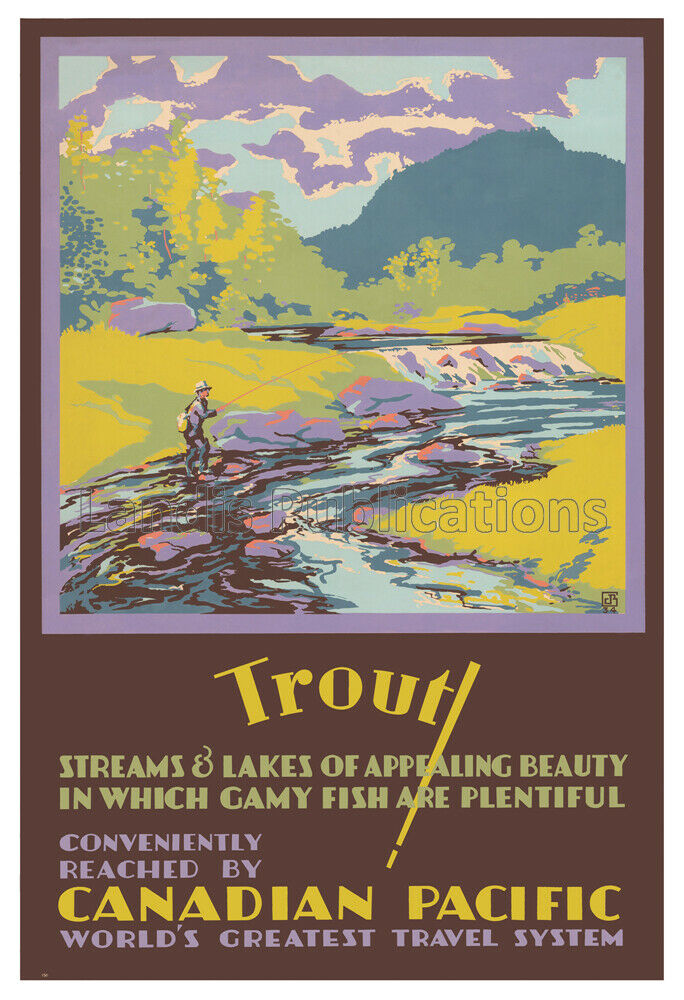-40%
Canadian Pacific Railway Trout Streams Vintage Travel Poster
$ 10.53
- Description
- Size Guide
Description
These are simply the best posters available! You will be thrilled with the image quality, vivid colors, fine paper, and unique subjects.OUR POSTERS ARE SIZED FOR STANDARD OFF-THE-SHELF FRAMES, WITH NO CUSTOM FRAMING REQUIRED, PROVIDING HUGE COST SAVINGS!
This beautiful reproduction poster has been re-mastered from a 1950's advertising brochure for the Canadian Pacific Railway, featuring trout fishing in the Canadian Rocky Mountains.
The vibrant colors and detail of this classic image have been painstakingly brought back to life to preserve a great piece of history.
The high-resolution, image is printed on 13" x 19" archival photo paper, on a large-format professional-grade giclée process printer. The poster is shipped in a rigid cardboard tube and is ready for framing.
The 13"x19" format is an excellent image size that looks great as a stand-alone piece of art, or as a grouped visual statement. These posters require
no cutting, trimming, or custom sizing
, and a wide variety of 13"x19" frames are readily available at your local craft or hobby retailer, and online.
A great vintage print for your home, shop, or business!
CANADIAN PACIFIC RAILWAY HISTORY
The Canadian Pacific Railway was originally built between Eastern Canada and British Columbia between 1881 and 1885 (connecting with Ottawa Valley and Georgian Bay area lines built earlier), fulfilling a promise extended to British Columbia when it entered Confederation in 1871. It was Canada's first transcontinental railway, but no longer reaches the Atlantic coast. Primarily a freight railway, the CPR was for decades the only practical means of long-distance passenger transport in most regions of Canada, and was instrumental in the settlement and development of Western Canada.
The CPR became one of the largest and most powerful companies in Canada, a position it held as late as 1975. Its primary passenger services were eliminated in 1986, after being assumed by Via Rail Canada in 1978. A beaver was chosen as the railway's logo in honor of Sir Donald A. Smith (1st. Baron Strathcona and Mount Royal) who had risen from Factor to Governor of the Hudson's Bay Company over a lengthy career in the beaver fur trade. Smith was a principal financier of the C.P.R. staking much of his personal wealth. In 1885, he drove the last spike to complete the transcontinental line.
The company acquired two American lines in 2009: the Dakota, Minnesota and Eastern Railroad and the Iowa, Chicago and Eastern Railroad. The trackage of the IC&E was at one-time part of CP subsidiary Soo Line and predecessor line The Milwaukee Road.
The combined DME/ICE system spanned North Dakota, South Dakota, Minnesota, Wisconsin, Nebraska and Iowa, as well as two short stretches into two other states, which included a line to Kansas City, Missouri, and a line to Chicago, Illinois, and regulatory approval to build a line into the Powder River Basin of Wyoming. It is publicly traded on both the Toronto Stock Exchange and the New York Stock Exchange under the ticker CP. Its U.S. headquarters are in Minneapolis.












